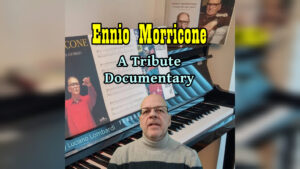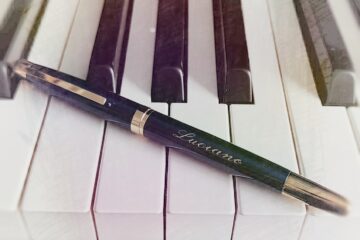Video documentary with curiosities, anecdotes and little secrets of the Maestro.
In this 50-minute video we talk about Ennio Morricone’s music and some famous or rare soundtracks.
Ennio Morricone is known all over the world especially for western films and a few other titles, such as “Once upon a time in America”, “Mission”, “Nuovo Cinema Paradiso”, but his production is much more extensive and varied than you think. Starting from his deep classical training, up to the most extravagant experiments, he has ventured into the exploration of all possible musical genres, passing from Jazz to Latin American music, from electronic to New Age.
The experience as an arranger of pop music has allowed him to put his creative curiosity to good use by introducing experiments that have made him unique and unmistakable, the creator of a new way of interpreting songs and the way to make them incredibly captivating.
He is one of the few musicians in the world of cinema to take care of all aspects of his works: from the composition of the score, through the orchestration (which for many colleagues is entrusted to other musicians), to the direction during the recording up to the stage of mixing, where the nuances of the sounds are a not negligible aspect.
In this very brief introduction, we will explore some faces of this varied artistic production, trying to discover even less known curiosities to the public.
In many films “music talks”: we will see some movie scenes in which music is the real protagonist, assuming the same importance, if not superior, to the dialogues.
We will make a brief overview by proposing some examples of minimalist music used by the Maestro, who with a few sounds manages to create memorable motifs and ideas: only two notes that have made the history of cinema; three notes, as a recurring thematic cell in different films and contexts.
We will see a sequence taken from the only cartoon set to music by Ennio Morricone, “Aida degli Alberi”, as an example of descriptive music in which musical instruments are used to imitate and reproduce the sounds of nature.
We will briefly analyze a compositional technique from which the film in which it is used takes the title, “Reverse Canon” in which the same theme is proposed simultaneously in its original version and backwards, through graphic examples taken from the score.
We will mention the difference between absolute and applied music and as a halfway example, we will listen to the “Canticle of the Jubilee” (2000) with the presentation provided directly by the Maestro.
We will carry out a roundup of citations of classical music in films and arrangements and an excursus of lesser-known themes to appreciate the great compositional flexibility of the Maestro.
We will also see some video contributions in which Ennio Morricone plays Deborah’s Theme on the piano (from Once upon a time in America), or where it is mentioned in other films and by other authors. From the film “The legend of the pianist on the ocean” we will enjoy together a nice scene in which the music portrays some characters, underlining the most curious aspects.
Finally, as an example of diegetic and non-diegetic music, we will see a scene from the film “Love Affair” (Warren Beatty) in which these two elements blend together.
Topics
- Introduction
- Distinctive and unconventional sounds
- “Enchanted Forest”
- Arrangements of classical music pieces in films
- “Norme con ironie” (rules with ironies)
- Variety of styles
- Ennio Morricone’s house and piano
- The “cross” score and the meeting with Pope Francis
- “Music Talks”: “Mission to Mars”
- The use of a theme and its variations
- If Ennio Morricone had written for Federico Fellini?
- The Maestro at the piano plays Nuovo Cinema Paradiso
- The sounds of everyday life and music with three notes
- Self-quotations
- “Canone Inverso”: absolute and functional music
- The film “The Holiday” (“L’Amore non va in vacanza”) mentions the Maestro
- The Maestro plays “Deborah Theme” on the piano
- “The Legend of 1900”: music as a characterization of the characters
- “Love Affair”: diegetic and non-diegetic music
- Classical style film music
- Collaboration with Andrea Bocelli
- “What dreams may come”: the rejected soundtrack
- Greetings from the Maestro and the dedication


